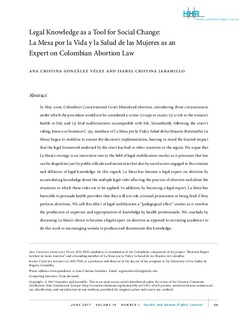Legal knowledge as a tool for social change: La mesa por la vida y la salud de las mujeres as an expert on Colombian abortion law
Journal article, Peer reviewed
Permanent lenke
http://hdl.handle.net/11250/2475452Utgivelsesdato
2017-01-01Metadata
Vis full innførselSamlinger
- Publications [1497]
Originalversjon
in Health and Human Rights Journal vol. 19 no. 1Sammendrag
In May 2006, Colombia’s Constitutional Court liberalized abortion, introducing three circumstances under which the procedure would not be considered a crime: (1) rape or incest; (2) a risk to the woman’s health or life; and (3) fetal malformations incompatible with life. Immediately following the court’s ruling, known as Sentence C-355, members of La Mesa por la Vida y Salud de las Mujeres (hereinafter La Mesa) began to mobilize to ensure the decision’s implementation, bearing in mind the limited impact that the legal framework endorsed by the court has had in other countries in the region. We argue that La Mesa’s strategy is an innovative one in the field of legal mobilization insofar as it presumes that law can be shaped not just by public officials and universities but also by social actors engaged in the creation and diffusion of legal knowledge. In this regard, La Mesa has become a legal expert on abortion by accumulating knowledge about the multiple legal rules affecting the practice of abortion and about the situations in which these rules are to be applied. In addition, by becoming a legal expert, La Mesa has been able to persuade health providers that they will not risk criminal prosecution or being fired if they perform abortions. We call this effect of legal mobilization a “pedagogical effect” insofar as it involves the production of expertise and appropriation of knowledge by health professionals. We conclude by discussing La Mesa’s choice to become a legal expert on abortion as opposed to recruiting academics to do this work or encouraging women to produce and disseminate this knowledge.
Serie
Health and Human Rights Journal vol. 19 no. 1Health and Human Rights Journal vol. 19 no. 1
